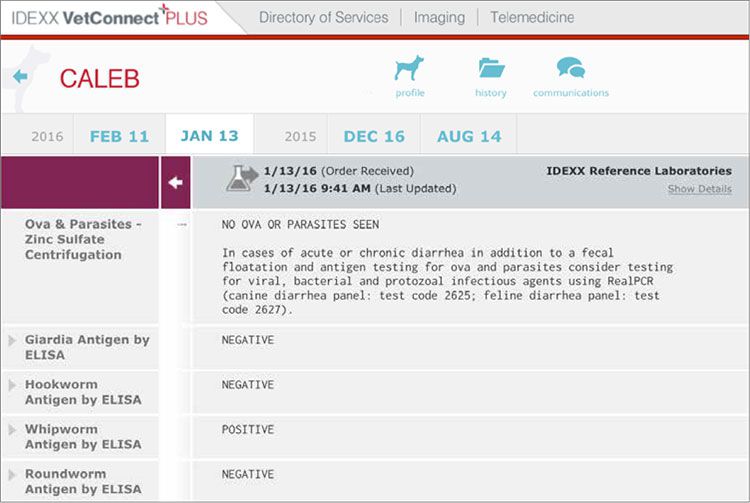Fecal Dx antigen testing
Case study: Caleb
Intestinal parasite antigen testing helps veterinarians find infections the microscope may miss

Background information
Name: Caleb
Age: 2 years
Breed: Welsh corgi
Gender: Neutered male
Presenting reason
Caleb presented for intermittent episodes of vomiting and diarrhea that have been going on for a few weeks and that had not been completely responsive to empirical treatment with metronidazole and supportive therapy.
History
Noteworthy in his history is that Caleb was diagnosed and treated for Giardia twice when he was 1.5 years old, following presentation with clinical signs of infection and testing positive for Giardia by ELISA.
Physical examination
Caleb was bright, alert, and responsive. He appeared well hydrated, and body temperature and respiratory rate were normal.
Diagnostic plan
For Caleb, as with other patients of similar age and observations, the following diagnostics along with a physical examination provided a good clinical picture:
- Chemistry panel, including the IDEXX SDMA Test and electrolytes
- Complete blood count (CBC)
- Fecal Dx Profile with Giardia (includes fecal ova and parasites with antigen testing by ELISA for hookworm, roundworm, whipworm, and Giardia)
- SNAP cPL Test
Diagnostic review
Based on history, physical examination, and laboratory results, Caleb was diagnosed with a whipworm infection.
Possible next steps
- Next-step considerations—treat the infection and begin monthly parasite protection with a broad-spectrum control product that includes one approved for whipworm treatment.
- Minimize ongoing risk of reinfection by good hygiene and picking up feces, per veterinarian recommendation.
- Recheck with fecal ova and parasites (O&P) and fecal antigen testing in 3 months.
- Healthy dogs that are maintained on a broad-spectrum monthly control product do not require retesting. If follow-up testing is warranted, retest with fecal O&P and fecal antigen testing 7–10 days after the final dose of anthelmintic.
Patient report

Discussion
Some parasites, like whipworms, can be difficult to diagnose because they shed their eggs intermittently and the eggs are particularly dense making them difficult to float. By testing for the antigen of an adult worm rather than the eggs, infections can be identified more reliably. Caleb’s case illustrates the fact that combining intestinal parasite antigen testing with fecal O&P by centrifugation is a more accurate test for detection of intestinal parasites than fecal O&P alone.
Suggested test profiles for sick dogs
Fecal Dx Profile with Giardia (test code 24639)
Provides a comprehensive screen for clinically ill dogs. This profile includes a fecal ova and parasites, Giardia, hookworm, roundworm, and whipworm antigens by ELISA.
Fecal Dx Profile (test code 5013)
Provides a standard screen for annual testing per Companion Animal Parasite Council (CAPC) guidelines.1–3 This profile includes a fecal ova and parasites, hookworm, roundworm, and whipworm antigens by ELISA.
How to screen dogs with diarrhea
Testing recommendations vary based on the duration and severity of diarrhea and the health and dietary habits of the dog or dogs affected.
Use this algorithm during sick visits
References
- CAPC guidelines: hookworms. Companion Animal Parasite Council website. www.capcvet.org/guidelines/hookworms. Accessed March 28, 2019.
- CAPC guidelines: ascarid. Companion Animal Parasite Council website. www.capcvet.org/guidelines/ascarid. Accessed March 28, 2019.
- CAPC guidelines: Trichuris vulpis. Companion Animal Parasite Council website. www.capcvet.org/guidelines/ trichuris-vulpis. Accessed March 28, 2019.